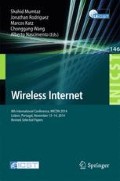Abstract
Exploiting random fluctuations of radio channel for key agreement has been investigated for several years; however, these methods of key reconciliation in wireless LANs are vulnerable to attacks especially in case of Line-of-Sight (LOS) channels. In the following paper we will verify whether applying antenna arrays with reconfigurable antennas reduces the number of key bits leaking to the eavesdropper by utilizing two types of attack: Nearest Neighbour Excursion (NNE) and Average RSSI.
Access this chapter
Tax calculation will be finalised at checkout
Purchases are for personal use only
References
Shannon, C.E.: Communication theory of secrecy systems. Bell Syst. Tech. J. 28, 656–715 (1949)
Wyner, A.D.: The wire-tap Channel. Bell Sys. Tech. J. 54, 1355–1387 (1975)
Maurer, U.M.: Secret key agreement by public discussion from common information. IEEE Trans. Inf. Theory 39(3), 733–742 (1993)
Wallace, J., Sharma, R.: Automatic secret keys form reciprocal MIMO wireless channel: measurement and analysis. IEEE Trans. Inf. Forensics Secur. 5(3), 381–392 (2010)
Ye, C., Mathur, S., Reznik, A., Shah, Y., Trappe, W., Mandayam, N.: Information-theoretically secret key generation for fading wireless channels. IEEE Trans. Inf. Forensics Secur. 5(2), 240–254 (2010)
Hofman, C.A., Knopp, A., Ogermann, D., Schwarz, R.T., Lankl, B: Deficiencies of common MIMO channel models with regard to indoor line-of-sight channels. In: IEEE 19th Symposium on Personal, Indoor and Mobile Radio Communications (2008)
Kolmonen, V.-M., Haneda, K., Hult, T., Poutanen, J., Tufvesson, F., Vainikainen, P.: Measurement-based evaluation of interlink correlation for indoor multiuser MIMO channels. IEEE Antennas Wirel. Propag. Lett. 9, 311–314 (2010)
Mehmood, R., Wallace, J.: Wireless security enhancement using parasitic reconfigurable aperture antennas. In: Proceedings of the 5th European Conference on Antennas and Propagation (2011)
Edman, M., Kiayias, A., Yener, B.: On passive inference against physical-layer key extraction. In: EUROSEC 2011, European Workshop on System Security, Salzburg, Austria (2011)
Author information
Authors and Affiliations
Corresponding author
Editor information
Editors and Affiliations
Rights and permissions
Copyright information
© 2015 Institute for Computer Sciences, Social Informatics and Telecommunications Engineering
About this paper
Cite this paper
Pilc, M., Stańczak, J. (2015). Verification of Various Attack Approaches Against CSI-Based Secret Key in Different Types of LOS Channels. In: Mumtaz, S., Rodriguez, J., Katz, M., Wang, C., Nascimento, A. (eds) Wireless Internet. WICON 2014. Lecture Notes of the Institute for Computer Sciences, Social Informatics and Telecommunications Engineering, vol 146. Springer, Cham. https://doi.org/10.1007/978-3-319-18802-7_25
Download citation
DOI: https://doi.org/10.1007/978-3-319-18802-7_25
Published:
Publisher Name: Springer, Cham
Print ISBN: 978-3-319-18801-0
Online ISBN: 978-3-319-18802-7
eBook Packages: Computer ScienceComputer Science (R0)

